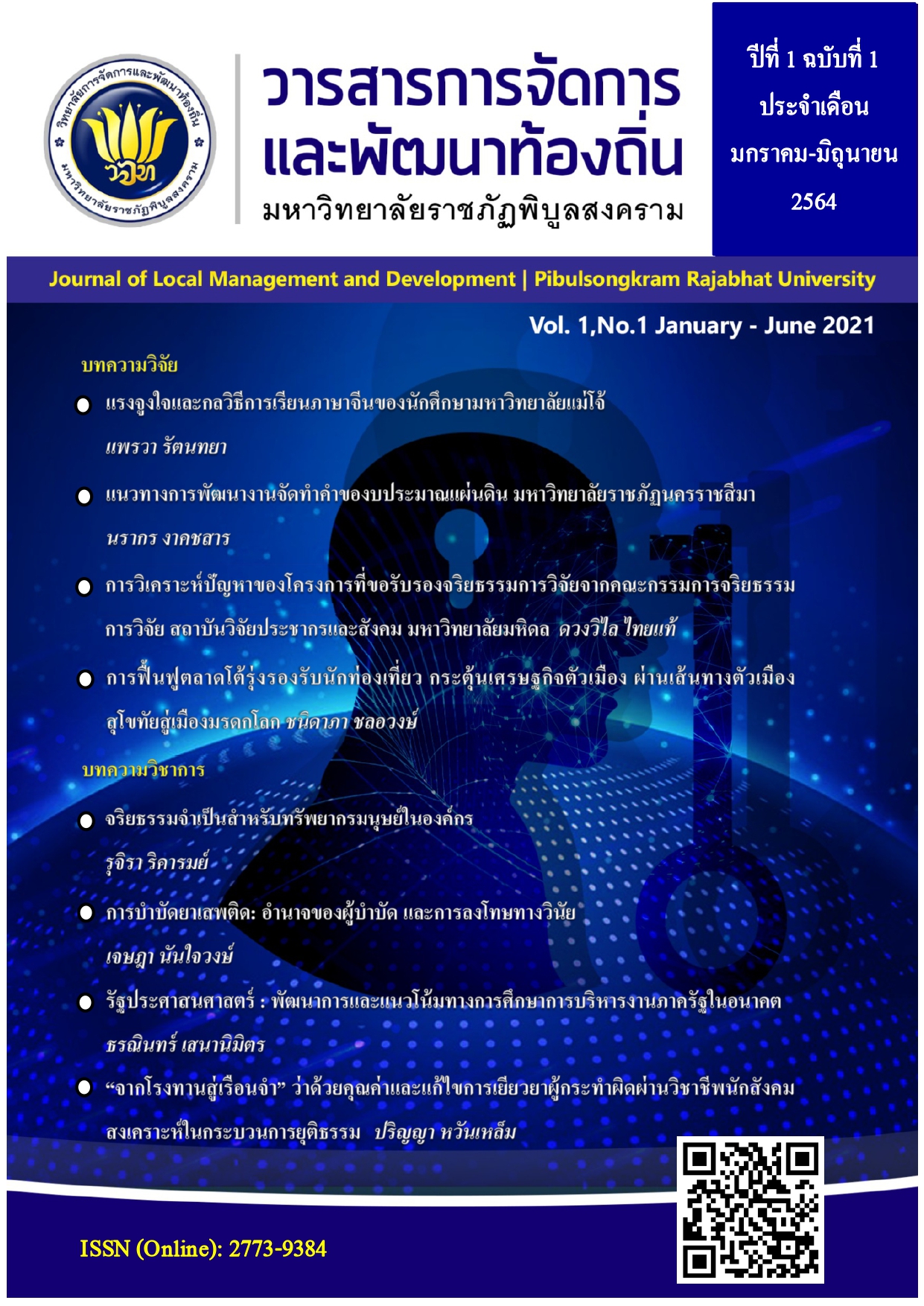ETHICS ARE ESSENTIAL FOR HUMAN RESOURCES IN AN ORGANIZATION
Keywords:
Ethics necessary, Human resources in the organization, Ethic, Ethical managementAbstract
Ethics are essential for human resources in an organization. Able to create values method use a guide to good behavior in accordance basic with ethical principles with brain intellectual, emotional and feely. Born from the use of moral spirituality. In born from the use of moral spirituality, the middle way, the relationship between need and reasoning. The aim of life and the ethical philosophy for living together with the social network of infinite change on this world is appear. The focusing on the conceptual in idea, decisions to demeanor with carefully consideration on being a good person and being a talent. So that an enable the human beings in the organization to see the path of the true good people and to act without impurity, leading to stability in the future with dignity. Which a adheres to four principles of ethics: 1) utilitarianism to consider in deed, 2) right to top line of holding individuals or groups of people, 3) fairness, compliance with fair agreements and 4) the golden rule to regard Affecting others with deep care. In addition, the ethics testing has five key guidelines: 1) Common sense test, consider the implications of this decision. 2) Test your best actions, considering ethical principles 3) Public disclosure test to consider appearing in the news media to the eyes of people around the world. 4) Test filtering, consider multiple perspectives from acknowledging and hearing opinions of society and the public; and 5) test pure thoughts, consider the prudence according to the truth, without the influence of self-dominating authority and force.
References
จินตนา บุญบงการ. (2552). จริยธรรมทางธุรกิจ. พิมพ์ครั้งที่ 11. กรุงเทพฯ : สำนักพิมพ์แห่งจุฬาลงกรณ์มหาวิทยาลัย.
ดวงเดือน พันธุมนาวิน. (2544). พฤติกรรมศาสตร์ เล่ม 2 จิตวิทยาจริยธรรมและจิตวิทยาการศึกษา. กรุงเทพฯ : ไทยวัฒนาพานิช.
ดวงเดือน พันธุมนาวิน. (2551). การวิจัยเพื่อการพัฒนาเครื่องมือวัดทางจิตแบบพหุระดับในบริบทของปรัชญาเศรษฐกิกจพอเพียง. รายงานการวิจัย. กรุงเทพฯ : สำนักงานคณะกรรมการวิจัยแห่งชาติ.
เนตร์พัณณา ยาวิราช. (2551). จริยธรรมธุรกิจ. พิมพ์ครั้งที่ 2. กรุงเทพฯ : ทริปเพิ้ล กรุ๊ป.
ประโยชน์ ส่งกลิ่น. (2561). การฟื้นคืนกลับมาของจริยธรรมเชิงคุณธรรมในการบริหารรัฐกิจ. มหาสารคาม : อภิชาติการพิมพ์.
ปานจิต จินดากุล. (2549). การสร้างองค์การที่มีศักดิ์ศรีและจริยธรรม. กรุงเทพมหานคร : สำนักงาน.
รัตนวดี โชติกพนิช. (2554). จริยธรรมและจรรยาบรรณในวิชาชีพครู. (พิมพ์ครั้งที่ 2). กรุงเทพฯ : ภาควิชาหลักสูตรและการสอน คณะศึกษาศาสตร์ มหาวิทยาลัยรามคำแหง.
วศิน อินทสระ. (2539). จริยธรรมกับบุคคล. กรุงเทพฯ : วัฒนาพานิช.
วศิน อินทสระ. (2551). จริยศาสตร์. กรุงเทพฯ : บรรณกิจ.
สุลักษณ์ ศิวรักษ์. (2550). คันฉ่องส่องจริยศาสตร์ : บทพิจารณาว่าด้วยธรรมะและอธรรมในสังคมไทย. กรุงเทพฯ : ศึกษิตสยาม.
Adams, B. G. & Balfour, D. L. (2005). “Public Service Ethics and Administrative Evil: Prospects and Problems,” in Federickson and Ghere, eds. Ethics in Public Management, pp. 114-138.
Aristotle. (1999). Nicomachean Ethics. Kitchener : Batoche Books.
Atkinson, R. C., Holmgren, J., & Juola, J. F. (1969). Processing time as influenced by the number of elements in a visual display. Perception & Psychophysics, 6(6), 321-326.
Bowman, J. S., & West, J. P. (2015). Public Service Ethics : Individual and Institutional Responsibilities. London : SAGE Publication Ltd.
Brown, R. (1968). Social Psychology. New York : The Free Press.
Carroll, J. B. (1993). Human cognitive abilities: A survey of factor-analytic studies. Cambridge University Press.
Good, C. V. (1973). Dictionary of Education (3rd ed.). New York : McGraw-Hill.
Hoffman, L. R. (1979). Applying experimental research on group problem solving to organizations. The Journal of Applied Behavioral Science, 15(3), 375-391.
Hooft, S. V. (2006). Understanding Virtue Ethics. Chesham : Acumen.
Kohlberg, L. (1976). Moral stages and moralization. Moral development and behavior, 31-53.
Koven, S. G. (2015). Public Sector Ethics: Theory and Applications. London : CRC Press.
Maclntyre, A. (2007). After Virtue: A Study in Moral Theory. Indiana : University of Notre Dame Press.
Menzel, D. C. (2001). Ethics and Public Management. PUBLIC ADMINISTRATION AND PUBLIC POLICY, 91, 349-364.
Nash, J. C. (1990). Compact numerical methods for computers: linear algebra and function minimisation. CRC press.
Piaget, J. (1960). The Moral Judgment of the Childs. Illinois : The Free Press.
Svara, J. (2015). The Ethics Primer for Public Administrators in Government and Nonprofit Organizations. Burlington : Jones & Bartlett Learning.

Downloads
Published
Issue
Section
License
ประกาศเกี่ยวกับลิขสิทธิ์
- เนื้อหาและข้อมูลในบทความที่ลงพิมพ์กับวิทยาลัยการจัดการและพัฒนาท้องถิ่นถือเป็นข้อคิดเห็น และความรับผิดชอบของผู้เขียนบทความโดยตรงซึ่งกองบรรณาธิการวารสารไม่จำเป็นต้องเห็นด้วย หรือร่วมรับผิดชอบใด ๆ
- บทความ ข้อมูล เนื้อหา รูปภาพ ฯลฯ ที่ได้รับการตีพิมพ์ในวิทยาลัยการจัดการและพัฒนาท้องถิ่นถือเป็นลิขสิทธิ์ของวารสารวารสารวิทยาลัยการจัดการและพัฒนาท้องถิ่น หากบุคคลหรือหน่วยงานใดต้องการนำทั้งหมดหรือส่วนหนึ่ง ส่วนใดไปเผยแพร่ต่อหรือเพื่อการกระทำการใด ๆ จะต้องได้รับอนุญาตเป็นลายลักษณ์อักษรจากวิทยาลัยการจัดการและพัฒนาท้องถิ่นก่อนเท่านั้น





